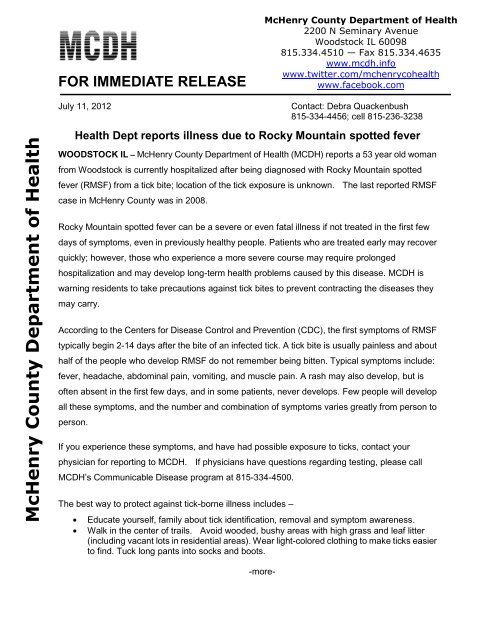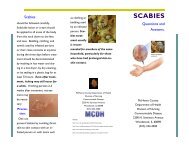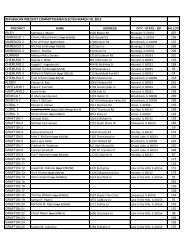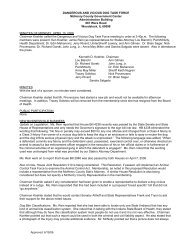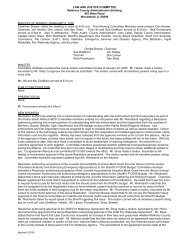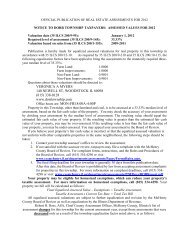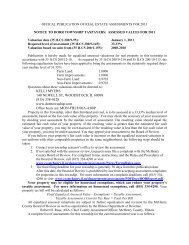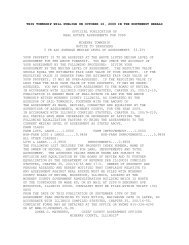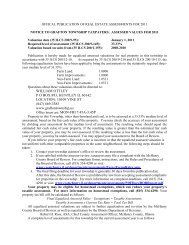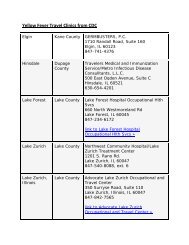Health Dept reports case of Rocky Mountain ... - McHenry County
Health Dept reports case of Rocky Mountain ... - McHenry County
Health Dept reports case of Rocky Mountain ... - McHenry County
Create successful ePaper yourself
Turn your PDF publications into a flip-book with our unique Google optimized e-Paper software.
<strong>McHenry</strong> <strong>County</strong> Department <strong>of</strong> <strong>Health</strong><br />
FOR IMMEDIATE RELEASE<br />
July 11, 2012 Contact: Debra Quackenbush<br />
815-334-4456; cell 815-236-3238<br />
<strong>Health</strong> <strong>Dept</strong> <strong>reports</strong> illness due to <strong>Rocky</strong> <strong>Mountain</strong> spotted fever<br />
WOODSTOCK IL – <strong>McHenry</strong> <strong>County</strong> Department <strong>of</strong> <strong>Health</strong> (MCDH) <strong>reports</strong> a 53 year old woman<br />
from Woodstock is currently hospitalized after being diagnosed with <strong>Rocky</strong> <strong>Mountain</strong> spotted<br />
fever (RMSF) from a tick bite; location <strong>of</strong> the tick exposure is unknown. The last reported RMSF<br />
<strong>case</strong> in <strong>McHenry</strong> <strong>County</strong> was in 2008.<br />
<strong>Rocky</strong> <strong>Mountain</strong> spotted fever can be a severe or even fatal illness if not treated in the first few<br />
days <strong>of</strong> symptoms, even in previously healthy people. Patients who are treated early may recover<br />
quickly; however, those who experience a more severe course may require prolonged<br />
hospitalization and may develop long-term health problems caused by this disease. MCDH is<br />
warning residents to take precautions against tick bites to prevent contracting the diseases they<br />
may carry.<br />
According to the Centers for Disease Control and Prevention (CDC), the first symptoms <strong>of</strong> RMSF<br />
typically begin 2-14 days after the bite <strong>of</strong> an infected tick. A tick bite is usually painless and about<br />
half <strong>of</strong> the people who develop RMSF do not remember being bitten. Typical symptoms include:<br />
fever, headache, abdominal pain, vomiting, and muscle pain. A rash may also develop, but is<br />
<strong>of</strong>ten absent in the first few days, and in some patients, never develops. Few people will develop<br />
all these symptoms, and the number and combination <strong>of</strong> symptoms varies greatly from person to<br />
person.<br />
If you experience these symptoms, and have had possible exposure to ticks, contact your<br />
physician for reporting to MCDH. If physicians have questions regarding testing, please call<br />
MCDH’s Communicable Disease program at 815-334-4500.<br />
The best way to protect against tick-borne illness includes –<br />
Educate yourself, family about tick identification, removal and symptom awareness.<br />
Walk in the center <strong>of</strong> trails. Avoid wooded, bushy areas with high grass and leaf litter<br />
(including vacant lots in residential areas). Wear light-colored clothing to make ticks easier<br />
to find. Tuck long pants into socks and boots.<br />
-more-<br />
<strong>McHenry</strong> <strong>County</strong> Department <strong>of</strong> <strong>Health</strong><br />
2200 N Seminary Avenue<br />
Woodstock IL 60098<br />
815.334.4510 — Fax 815.334.4635<br />
www.mcdh.info<br />
www.twitter.com/mchenrycohealth<br />
www.facebook.com
Apply insect repellent containing DEET (30% or less) to exposed skin. Follow label<br />
instructions.<br />
Conduct full-body tick checks on family member’s clothing (including underarms,<br />
in/around ears, inside belly button, behind knees, between legs, around waists, and<br />
especially in the hair). Also check any gear taken on outings.<br />
Keep pets out <strong>of</strong> tick habitats like tall grass/brush. Ask your vet to recommend an<br />
over-the-counter tick killer/repellent. Always examine pets before bringing them inside.<br />
The CDC recommends bathing or showering as soon as possible after coming indoors<br />
(preferably within two hours) to wash <strong>of</strong>f and more easily find ticks.<br />
For more information on RMSF, contact MCDH’s Communicable Disease Program at<br />
815-334-4500 or visit http://www.co.mchenry.il.us/departments/health/Pages/EHtick.aspx.<br />
###<br />
“Working to prevent disease and promote health and safety for all people <strong>of</strong> <strong>McHenry</strong> <strong>County</strong> since 1966.”


